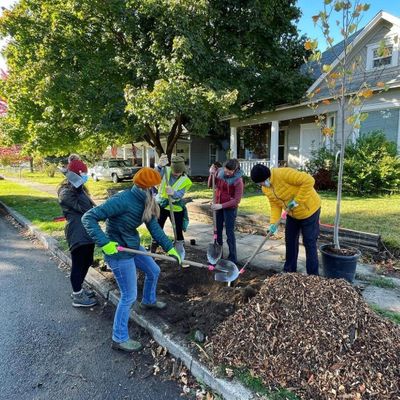What does Spokane need most? Groups narrows priorities to more shade, housing, child care or mental health services

Spokane County might see a new initiative to expand the region’s tree canopy, boost its mental health or child care services, or ease the local housing crisis.
Priority Spokane, a nonprofit that collaborates with agencies to identify and address countywide issues, has narrowed its priorities to four potential goals.
Planting more heat-resistant trees could help cool days over 90 degrees and improve air quality. But that possible focus will be measured against improved access to mental health services, expansion of child care options and creation of alternative housing sources.
Priority Spokane will work toward selecting a top initiative from among those four by year’s end.
“We usually have a top three but had a tie this year, which is kind of exciting,” said Ryan Oelrich, Priority Spokane executive director.
Oelrich said the tie was between increasing affordable housing and expanding the area’s tree canopy.
With its focus narrowed for the year, the nonprofit will be releasing a data-driven report for organizations on the four priorities.
“We don’t want to reinvent the wheel and duplicate, so we’ll try to figure out where we can focus on an initiative we can accomplish in the next three to five years,” Oelrich said.
Since September, Priority Spokane and partner organizations used input and data to narrow 12 possible goals to four. The organization worked with Eastern Washington University’s Institute for Public Policy & Economic Analysis, the Spokane Regional Health District, the Junior League of Spokane and Priority Spokane’s 27 member organizations.
The collective groups also tapped Spokane County residents through online surveys, which Priority Spokane has done every five years since 2008.
Specifically, the results of the surveys and meetings narrowed the goals this year to:
• Provide greater access to mental health services to improve public safety;
• Expand child care capacity to boost the economy;
• Expand the tree canopy to enhance the environment;
• Explore alternative housing such as shared equity, tiny homes or co-housing.
Priority Spokane taps people with experience and interest in six community areas: health, housing, economy, education, environment and public safety. They use data to identify priorities that could lead to measurable improvements.
Priority Spokane’s past initiatives included a focus on raising high school graduation rates, as well as on ways to combat trauma that can lead to domestic violence and suicides.
Oelrich said the organization this year did focus groups with eight minority populations and used data to consider equity issues , “especially as it relates to people of color in Spokane.”
More than 800 people were part of the meetings. Another 3,000-plus votes were cast online via email surveys.
Priority Spokane partnered with Harvard University doctors to develop the Stress and Trauma Education Program, or STEP, for mental health support virtually during the COVID-19 pandemic. It offered basic mental health tools, and now, STEP is nationwide.
“We used this across Spokane County during the pandemic, but now this program is being used by the Air Force and across the country,” Oelrich said. “That is something we built right in Spokane as the result of this process.
Priority Spokane has a fund within the Innovia Foundation, which is the nonprofit’s fiscal sponsor. A steering committee makes decisions on awarding grants to nonprofits and agencies working on Priority Spokane issues, according to its website.
“Previously, our work raised high school graduation rates from under 60% to over 80% in five years using this process,” Oelrich said. “Priority Spokane does the planning, we do the research, we fund the work.”